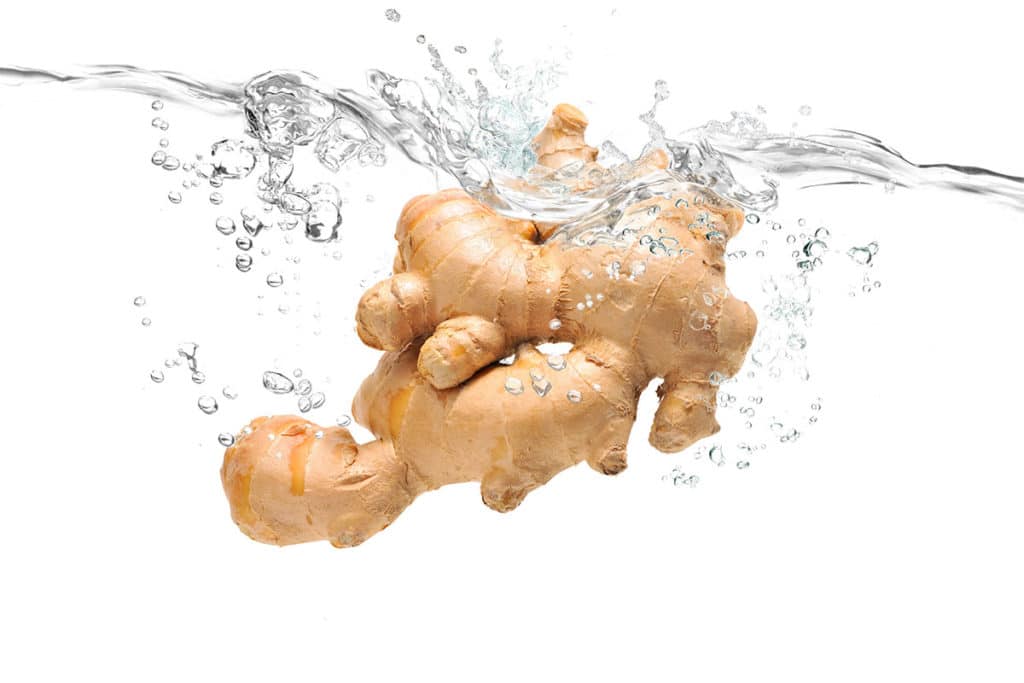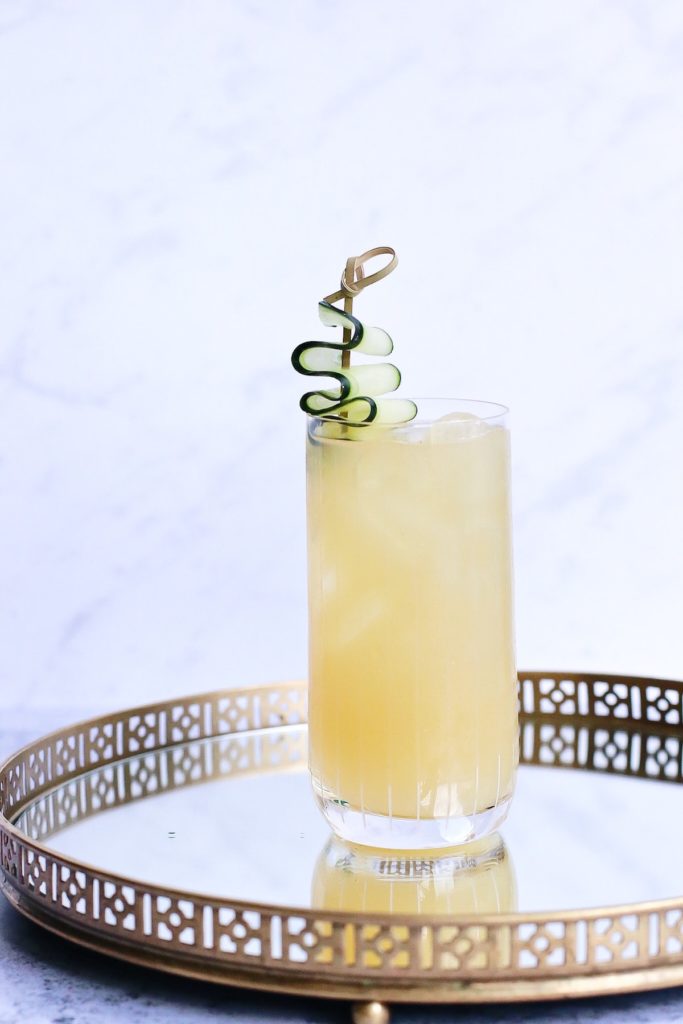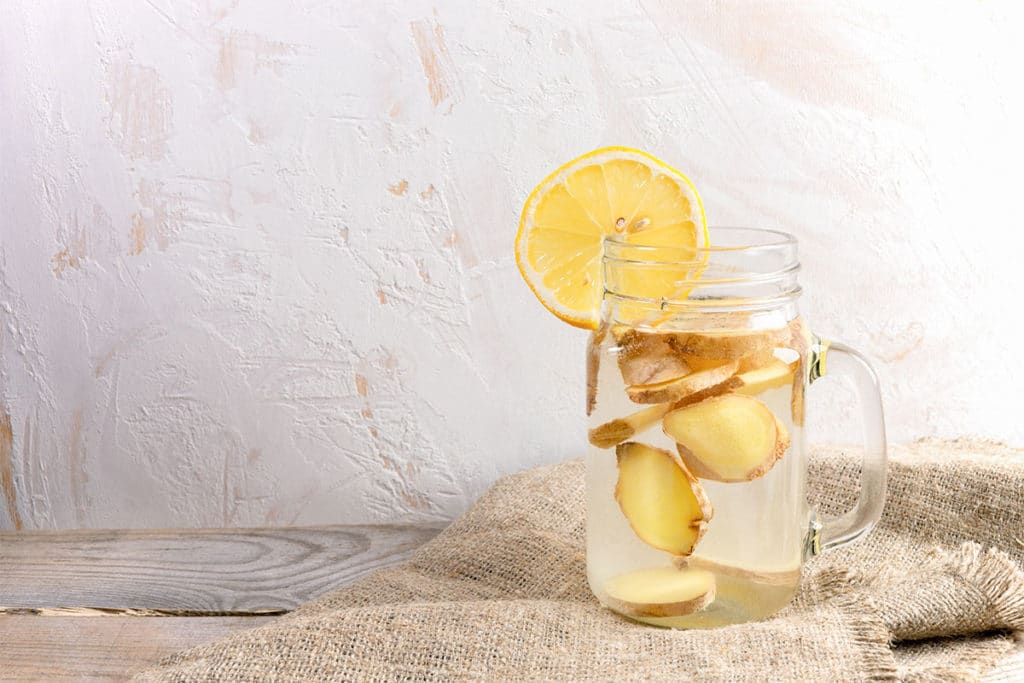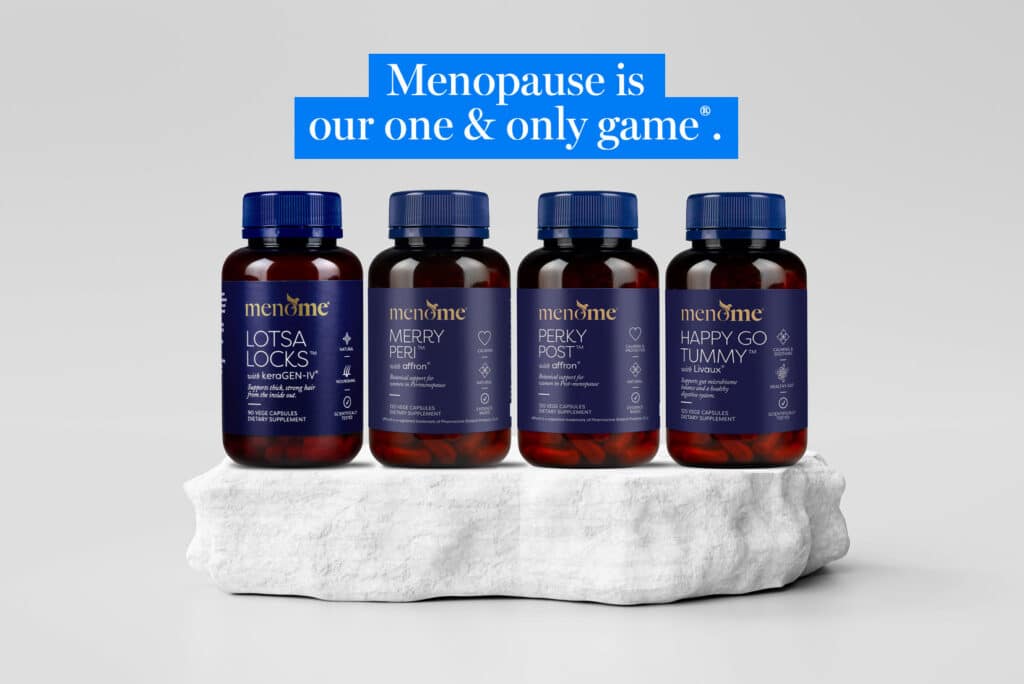Do you love ginger like we do? Well, guess what? We’ve found adding ginger water to our daily routine makes us feel goooood plus it’s a brilliant digestive aid.
What’s more, there are a number of other reasons why ginger water is so good for you in peri- and post-menopause.
The science has spoken
Science is showing ginger to be a great buddy for healthy ageing1. Although more definitive studies are needed the information is looking good.
Overall, ginger (technically known as zingiber officinale) is known to have a multitude of powerful benefits2. Indeed, it’s why the ancient wisdom of medicines such as Ayurveda and TCM* have used ginger for thousands of years3.
Furthermore, if you add it to H2O to make ginger water it’s super tasty and hydrating.
So, what are some of the benefits of ginger?

- Anti-inflammatory
- Calms nausea
- Minimises arthritic pain (do I hear a hallelujah?!)
- Enhances metabolism and therefore weight management4
- May minimise hot flushes5 (With that said, it’s a heating herb so it’s important to dilute it if you’re experiencing hot flushes and night sweats.)
- Helps with high blood pressure
- May reduce the incidence of migraines
- Reduces the production of cortisol
- High in antioxidants
- Supports the digestive system
- Stabilises blood sugar
- May improve allergies
- Boosts immunity
- Beneficial for the thyroid
- Ginger is widely purported to be anti-cancer6,7 and anti-diabetic8
In addition?
Ginger (and by default ginger water) is a cleansing aid and diuretic. Therefore it can help to support the liver to eliminate unwanted toxins. And we’ve got to look after our liver as we grow older.
As a matter of fact, a lot of the above list can fall under perimenopause signs and symptoms.
Would you like more information about the recognised signs and symptoms of menopause? You can find the list here
How to make ginger water
While ginger water is the perfect refresher on warmer days, if the temperature’s cooler you can drink it warm as a tea.
And you can add more punch with other ingredients such as lemon, lime and cucumber.
What you need:
- 1-2 teaspoons grated or sliced fresh ginger
- 1-4 cups pure filtered water (cup or jug)
- Optional: juice of lemon or lime
Tip: about one teaspoon of grated ginger is a good ‘dose’ and the fresher the better. The good news is you can freeze it and use it straight from the freezer.

How to make ginger water:
- Add fresh grated or sliced ginger to a cup or jug
- Boil your water and add it to the ginger
- Steep for three minutes
- Alternatively, for extra flavour, you could combine both in a saucepan and simmer for a few minutes
- Strain the ginger through a sieve or tea strainer
- Chill in the refrigerator or, if you’re having as warm tea, serve immediately
Conclusion
Ginger can be a delicious wellness addition to your day during menopause and midlife. And one easy way to have it is as ginger water or tea. But it’s also yummylicious when added to other dishes also such as stir fries, curries and one-pot dishes.
Note: ginger may not be recommended if you’re taking blood thinners.
*Traditional Chinese Medicine
Disclaimer: Our articles are a guideline only. It’s always best to check with your doctor as herbs are powerful and some may not interact well with prescription medications.
Share with a friend
Sign up to our mailing list for the latest news and stories and receive a $5 discount code to redeem on your first purchase, plus receive a 3-step eBook on ways to support your body through menopause.
This site is protected by reCAPTCHA and the Google Privacy Policy and Terms of Service apply.
Related Articles
References
- Ozkur M, Benlier N, Takan I, Vasileiou C, Georgakilas AG, Pavlopoulou A, Cetin Z, Saygili EI. Ginger for Healthy Ageing: A Systematic Review on Current Evidence of Its Antioxidant, Anti-Inflammatory, and Anticancer Properties. Oxid Med Cell Longev. 2022 May 9;2022:4748447. doi: 10.1155/2022/4748447. PMID: 35585878; PMCID: PMC9110206.
- Mao QQ, Xu XY, Cao SY, Gan RY, Corke H, Beta T, Li HB. Bioactive Compounds and Bioactivities of Ginger (Zingiber officinale Roscoe). Foods. 2019 May 30;8(6):185. doi: 10.3390/foods8060185. PMID: 31151279; PMCID: PMC6616534.
- Ali BH, Blunden G, Tanira MO, Nemmar A. Some phytochemical, pharmacological and toxicological properties of ginger (Zingiber officinale Roscoe): a review of recent research. Food Chem Toxicol. 2008 Feb;46(2):409-20. doi: 10.1016/j.fct.2007.09.085. Epub 2007 Sep 18. PMID: 17950516.
- Ebrahimzadeh Attari V, Malek Mahdavi A, Javadivala Z, Mahluji S, Zununi Vahed S, Ostadrahimi A. A systematic review of the anti-obesity and weight lowering effect of ginger (Zingiber officinale Roscoe) and its mechanisms of action. Phytother Res. 2018 Apr;32(4):577-585. doi: 10.1002/ptr.5986. Epub 2017 Nov 29. PMID: 29193411.
Clinicaltrials.gov, University of Duhok, Naroosh Hashim Taha
- Mashhadi NS, Ghiasvand R, Askari G, Hariri M, Darvishi L, Mofid MR. Anti-oxidative and anti-inflammatory effects of ginger in health and physical activity: review of current evidence. Int J Prev Med. 2013 Apr;4(Suppl 1):S36-42. PMID: 23717767; PMCID: PMC3665023.
- Baliga MS, Haniadka R, Pereira MM, D’Souza JJ, Pallaty PL, Bhat HP, Popuri S. Update on the chemopreventive effects of ginger and its phytochemicals. Crit Rev Food Sci Nutr. 2011 Jul;51(6):499-523. doi: 10.1080/10408391003698669. PMID: 21929329.
- Khandouzi N, Shidfar F, Rajab A, Rahideh T, Hosseini P, Mir Taheri M. The effects of ginger on fasting blood sugar, haemoglobin a1c, apolipoprotein B, apolipoprotein a-I and malondialdehyde in type 2 diabetic patients. Iran J Pharm Res. 2015 Winter;14(1):131-40. PMID: 25561919; PMCID: PMC4277626
For more scientific reading on ginger, The Amazing and Mighty Ginger is a great resource. You can find it here. www.ncbi.nlm.nih.gov/books/NBK92775/












